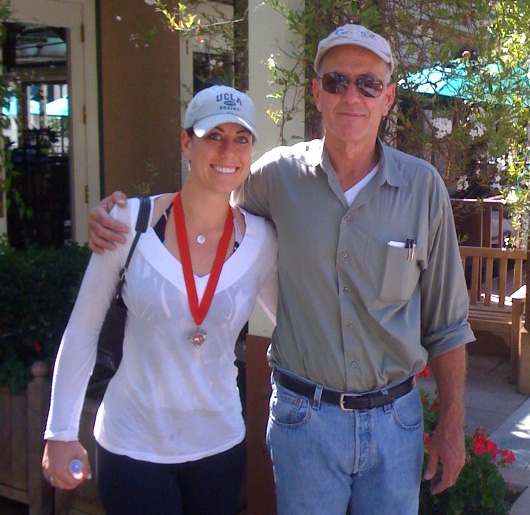I owe you a "Part 2" post on how I got my new position as a Career Development Program Manager at Google. Trust me - I've been working on it. But I started writing about all the various networking and interviewing tactics I used in a mile-long list of tasks, and I bored myself to tears. I've been wracking my brain, struggling mightily to figure out how to boil down all those steps into something useful for you. The lightning bolt of inspiration, and an answer to my boring blog post woes Then Grace Boyle emailed me about participating in her joint "Crush it" contest with Gary Vaynerchuk, of WineTV fame. Sparks flew when I read the prompt: "Skills are cheap, passion is priceless."
YES. Yes, yes, yes! Deep down, I *know* that passion is what got me my new job. It's not the handy 9-square one-sheeter that I used for interviews (don't worry, I still created a template for you).
I've got big plans...and they don't start with self-censorship The contest prompt is to "write a blog post about how you’re crushing it, your dreams to crush it, and what this phrase means to you." My natural inclination is to be humble and thank everyone else who made the transition and new job possible (including you, universe). But that's not helpful right now. This post is about CRUSHING IT. So I'm going to step out of character for a minute and tell you how I'm crushing it and how I plan to crush it even more tomorrow, and the day after that, and so on.
In Part 1 I wrote about the anxiety and unhappiness I developed after getting clear on what I really wanted. I felt sick as I watched from the sidelines as my true path passed by. From the day I started coach training in Dec. 2007, I knew my calling was to help people make their lives easier, one simple, practical step at a time. And in doing that, to give people the confidence and encouragement they were hungry for, to help them live their lives in a big, full way.
From a spark to a brush fire After attending my first coach training class, I turned that spark of inspiration, that clarity of my purpose (and related activities), into a fire. I took coaching classes on my free weekends. I coached clients at night and in the early morning. I worked on 20% projects related to coaching and development that I tacked onto my existing 100% plate of responsibilities. I developed workshops for people because I had a vision and I wanted to share it. I did not ask for permission to help people. I just did. And by exercising my passion, my skills grew naturally. They had room to breathe.
When I didn't see an immediate direct link between my passions and my job description at work, I started a blog. I figured if I built it, they would come. If I could add value, in ways big and small, you would come. And honestly, the emails and comments I receive saying I helped or inspired you move me to tears. My "keepers" bucket is so full that I get overwhelmed. And that's how I know that I'm crushing it.
Because I feel myself crushing it. Next week I start my job - and guess what? They want to pay for my coaching certification and let me spend time on that as part of my role. I'm going to get Myers Briggs certified and facilitate classes, and work on developing other very cool career development programs. Somehow I landed my dream job, and I'm just waiting for someone at the top to find out that they are PAYING ME to do what I love. But the funny thing is, there is a need for me to do what I love at Google. So everybody wins. And that is called crushing it.
Who me? Yeah. YOU. Just so you know - I don't walk around floating on clouds all day - yet. That is going to change. Especially if I want to continue crushing it at bigger and bigger levels. My inner critic says things like "Don't celebrate, the other shoe is going to drop any minute!" or "Who are you to say things like 'you're crushing it'?!"
And then I remind myself - playing small does not serve anyone (thank you, Marianne Williamson). It does not serve me, it does not serve you, and it does not serve the world. At first, saying I'm "crushing it" felt like playing dress-up - trying on a pair of shoes that were too big. Who, me?! Pfft! Part of crushing it is owning it and enjoying it. Whatever that means to you. So let me say it again: don't just crush it. Own it.
Skills are cheap, passion is priceless You want to change jobs? Start a blog? Write, dance, exercise, sing or play more? Make wine videos to educate the masses? Skills are cheap...and overrated. You probably have all the skills you need already. So face those obstacles and fears head-on and MAKE room for what you really care about in your life. Know that it won't always be easy, nor is it supposed to be. Get out there anyway. Step fully into what you want and crush it. We're waiting for you.
***
Here's a preview of the Job Interview One-Sheeter template I mentioned above (for those reading via feed-reader, click here). If you like it, do me a favor and give it a rating! As mentioned in a previous post, I am building a Google Templates empire. I've also added a tab to my top navigation where you can access all of my templates.
 I would be remiss if I didn't write the obligatory "big personal athletic moment as metaphor for life" blog post after finishing my triathlon. So here I go.
Contrary to the story I made up for many years that "I could never do a triathlon because the swimming would kill me," yesterday I completed the
I would be remiss if I didn't write the obligatory "big personal athletic moment as metaphor for life" blog post after finishing my triathlon. So here I go.
Contrary to the story I made up for many years that "I could never do a triathlon because the swimming would kill me," yesterday I completed the 





